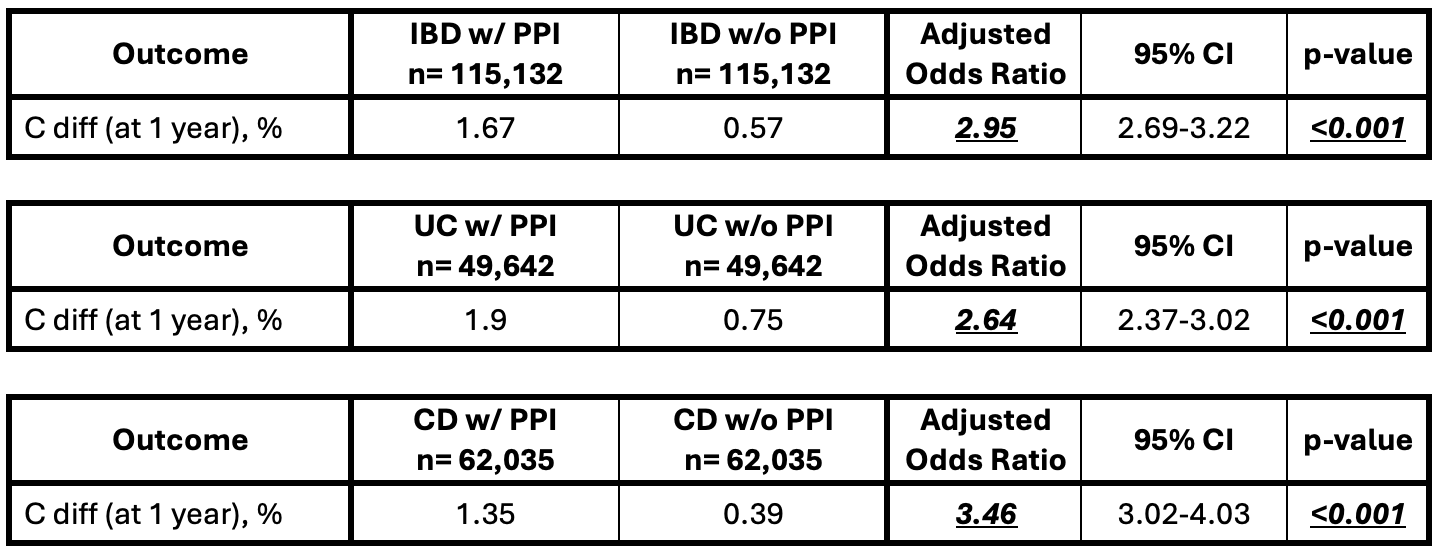Monday Poster Session
Category: IBD
Proton Pump Inhibitors Increase Risk of <i>Clostridioides difficile</i> in Patients With Inflammatory Bowel Disease
P3222 - Proton Pump Inhibitors Increase Risk of Clostridioides difficile in Patients With Inflammatory Bowel Disease
Monday, October 27, 2025
10:30 AM - 4:00 PM PDT
Location: Exhibit Hall

Abdelkader Chaar, MD
SUNY Upstate Medical University
Syracuse, NY
Presenting Author(s)
Abdelkader Chaar, MD1, Karan Sachdeva, MBBS, MPH1, Ahmad Nawaz, MBBS1, Albert Zottola, BA1, Shanti Patel, MBBS2, Idan Goren, MD1
1SUNY Upstate Medical University, Syracuse, NY; 2Yale University School of Medicine, New Haven, CT
Introduction: Clostridioides difficile infection (CDI) is associated with significant morbidity. Usage of proton pump inhibitors (PPI) is a known risk factor in developing CDI in the general population. However, data about the risk of CDI among inflammatory bowel disease (IBD) patients who are on PPI are limited. In this study, we aim to assess this relationship using a large international database.
Methods: We conducted a retrospective cohort study using TriNetX, a global multi-institutional federated research database, on adults (≥18 years) diagnosed with IBD over a 20-year period from January 2005 to December 2024 and were prescribed PPIs within the first 6 months from diagnosis. To control for confounders, 1:1 propensity score matching was performed based on age, sex, and race. Our primary outcome of interest was a diagnosis of CDI within 1 year of initiating PPIs. Subgroup analysis was performed for those who had a diagnosis of ulcerative colitis (UC) or Crohn’s disease (CD) separately. Adjusted odds ratios (aORs) with 95% confidence intervals (CIs) were calculated.
Results: We identified 528,121 patients with IBD, of whom 115,132 (5.51%) were exposed to PPI therapy. Patients with PPI use were older (mean age 50.5 vs. 46 years; p < 0.001) and included more white (70.71% vs. 63.56; p< 0.001) and female (51.94% vs. 51.17; p< 0.001) patients when compared to non-PPI users. Propensity score matching resulted in 115,132 patients in each group. IBD patients who were exposed to PPI had a significantly higher risk for CDI when compared to no PPI use (aOR 2.95, 95% CI 2.69-3.22). Similarly, risk of CDI increased in PPI users among UC (aOR 2.69, 95% CI 2.37-3.02) and CD (aOR 3.46, 95% CI 3.02-4.03) patients compared to non-PPI users. (Table 1).
Discussion: Our study showed that PPI use in patients with IBD increases the risk for developing CDI within 1 year by 3-folds when compared to non-PPI users. Similar trends were observed when stratifying patients by their IBD phenotype. PPI use in IBD patients should be reserved for clear clinical indications to minimize the risk of CDI.

Figure: Table 1: Summary of Outcomes.
Disclosures:
Abdelkader Chaar indicated no relevant financial relationships.
Karan Sachdeva indicated no relevant financial relationships.
Ahmad Nawaz indicated no relevant financial relationships.
Albert Zottola indicated no relevant financial relationships.
Shanti Patel indicated no relevant financial relationships.
Idan Goren indicated no relevant financial relationships.
Abdelkader Chaar, MD1, Karan Sachdeva, MBBS, MPH1, Ahmad Nawaz, MBBS1, Albert Zottola, BA1, Shanti Patel, MBBS2, Idan Goren, MD1. P3222 - Proton Pump Inhibitors Increase Risk of <i>Clostridioides difficile</i> in Patients With Inflammatory Bowel Disease, ACG 2025 Annual Scientific Meeting Abstracts. Phoenix, AZ: American College of Gastroenterology.
1SUNY Upstate Medical University, Syracuse, NY; 2Yale University School of Medicine, New Haven, CT
Introduction: Clostridioides difficile infection (CDI) is associated with significant morbidity. Usage of proton pump inhibitors (PPI) is a known risk factor in developing CDI in the general population. However, data about the risk of CDI among inflammatory bowel disease (IBD) patients who are on PPI are limited. In this study, we aim to assess this relationship using a large international database.
Methods: We conducted a retrospective cohort study using TriNetX, a global multi-institutional federated research database, on adults (≥18 years) diagnosed with IBD over a 20-year period from January 2005 to December 2024 and were prescribed PPIs within the first 6 months from diagnosis. To control for confounders, 1:1 propensity score matching was performed based on age, sex, and race. Our primary outcome of interest was a diagnosis of CDI within 1 year of initiating PPIs. Subgroup analysis was performed for those who had a diagnosis of ulcerative colitis (UC) or Crohn’s disease (CD) separately. Adjusted odds ratios (aORs) with 95% confidence intervals (CIs) were calculated.
Results: We identified 528,121 patients with IBD, of whom 115,132 (5.51%) were exposed to PPI therapy. Patients with PPI use were older (mean age 50.5 vs. 46 years; p < 0.001) and included more white (70.71% vs. 63.56; p< 0.001) and female (51.94% vs. 51.17; p< 0.001) patients when compared to non-PPI users. Propensity score matching resulted in 115,132 patients in each group. IBD patients who were exposed to PPI had a significantly higher risk for CDI when compared to no PPI use (aOR 2.95, 95% CI 2.69-3.22). Similarly, risk of CDI increased in PPI users among UC (aOR 2.69, 95% CI 2.37-3.02) and CD (aOR 3.46, 95% CI 3.02-4.03) patients compared to non-PPI users. (Table 1).
Discussion: Our study showed that PPI use in patients with IBD increases the risk for developing CDI within 1 year by 3-folds when compared to non-PPI users. Similar trends were observed when stratifying patients by their IBD phenotype. PPI use in IBD patients should be reserved for clear clinical indications to minimize the risk of CDI.

Figure: Table 1: Summary of Outcomes.
Disclosures:
Abdelkader Chaar indicated no relevant financial relationships.
Karan Sachdeva indicated no relevant financial relationships.
Ahmad Nawaz indicated no relevant financial relationships.
Albert Zottola indicated no relevant financial relationships.
Shanti Patel indicated no relevant financial relationships.
Idan Goren indicated no relevant financial relationships.
Abdelkader Chaar, MD1, Karan Sachdeva, MBBS, MPH1, Ahmad Nawaz, MBBS1, Albert Zottola, BA1, Shanti Patel, MBBS2, Idan Goren, MD1. P3222 - Proton Pump Inhibitors Increase Risk of <i>Clostridioides difficile</i> in Patients With Inflammatory Bowel Disease, ACG 2025 Annual Scientific Meeting Abstracts. Phoenix, AZ: American College of Gastroenterology.
